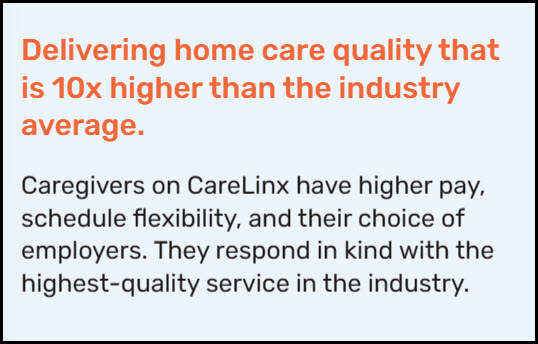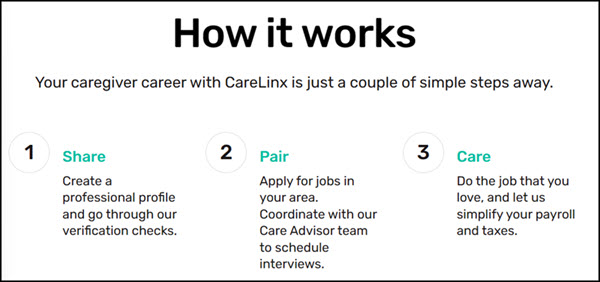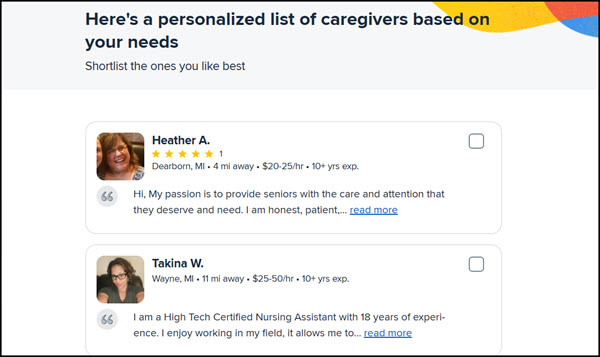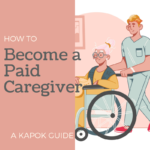
Looking for a career as a caregiver or part-time work in the field of aging? Now is an excellent time to do so, as this country is experiencing a major shortage of direct care workers.
Many families get around the challenge by becoming informal caregivers – supporting their loved ones at home themselves. But, doing so can be exhausting and overwhelming. While some families choose to send loved ones to assisted living or memory care facilities, others look for a paid caregiver instead.
We are also in a crisis for senior care, as the baby boomers are now reaching retirement age. With so many seniors who need care, we need a large number of caregivers, nurses, and other direct care workers to support them. There aren’t nearly enough, so there’s no shortage of demand and plenty of opportunity.
So, how do you break into the field and become a professional caregiver? What can you expect from the role and is it the right fit for you?
This guide specifically focuses on finding paid work as a professional caregiver. Some of the processes are similar if you hope to be paid to care for a family member, but there are extra considerations as well. A Place for Mom offers an excellent guide for family caregivers hoping to get paid. We also have an eBook that teaches you many ways to make money as a caregiver.
How to Become a Paid Caregiver
First, there are two different routes to becoming a paid caregiver. You might work with families directly or you might work with an agency instead. Both approaches are viable. It’s simply a matter of deciding which works best for you.
Working for Families
Working with families is easier in some senses, as you may need less training and have a greater chance to develop a relationship and rapport. There can also be more flexibility, as your schedule and specific tasks will be negotiable.
This approach can also lead to a greater sense of connection, as you might be spending a large amount of time with just one or two seniors, versus supporting multiple when working for an agency.
However, while working with families provides flexibility, negotiations can get complicated. Some families may have unrealistic expectations of caregivers, like expecting you to be available every day or to cancel your own plans whenever asked. There’s also the risk that the family blames you for any issue that arises, even if you did nothing wrong.
Because of this, it’s crucial to have a clear contract with the family, so everyone is on the same page.
Working for an Agency
Working for an agency provides less flexibility and may mean you’re supporting multiple seniors. However, you also have more support from the organization and there are backup caregivers. This should make it easier to get time off when you need it – lowering your risk of burnout and making the job more manageable.
There’s likely to be more protection for you as well, which is good news if something unexpected happens (like the senior falls).
Training and Certification Requirements
Requirements for training and certification vary significantly from one state to the next. At the same time, what you specifically need is going to differ depending on the role that you’re looking at.
For example, you might not need any training at all to be a family caregiver, even if you are getting paid for that role. In contrast, if you are being formally hired by an organization, then the requirements may be different.
However, there are some exceptions to these general rules and you need to work out the specific requirements for your state early on. The Caregiver List provides a useful breakdown of how training varies between states. This is a great starting point, although you’ll still need to check locally to find up-to-date information for your specific situation.
Beyond this, training and certification may be needed for more complex roles. This is particularly true for any position that requires the provision of medical care, such as certified nursing assistants (CNAs) and home health aides (HHAs).
If you are already an active nurse practitioner, social worker, or public health professional, consider enrolling in one of these AGACNP certificate programs to help you efficiently transition into older adult caregiving.
Some sources of funding may also require families to hire caregivers with specific certifications.
Finally, if you are looking for a formal position as a caregiver, such as through an agency, having certifications may be a significant advantage.
- Often the agency will ask for information about your licensing and training. Having the right certifications could even be essential for obtaining the job.
- Talking to the specific organization is normally the best way to find out what training you are going to need. However, you can also look at the common types of requirements for your state and use these to determine the types of training most relevant to you.
You might have other types of education as well, such as if you completed an adult gerontology masters degree online. While such a degree isn’t directly related to caregiving, it does have some benefits, like helping you to understand the aging senior better.
Obtaining the Relevant Training

There are various options for training and certification. This includes going through community colleges and other educational institutions, along with training through national organizations, especially those that focus on caregiving.
Some training is even available online, such as through the American Caregiver Association, which offers certification programs for nonmedical in-home care providers.
At the same time, there are a number of safety certifications available through various organizations, such as the American Red Cross.
Many of these certifications may be relevant to informal (and unpaid) caregivers, as well as paid ones. For example, this training can include home safety, accident-proofing the home, bathing, healthy eating, and more. You can also check out the events we’ve listed in our National Caregiver Events Directory, some of which specifically focus on training.
Even if you don’t need training for the role that you are pursuing, it is an area that may be worth considering.
For one thing, training helps you to be more confident in your role and reduces the chance of any issues arising. At the same time, having training can provide some peace of mind to the people who hired you.
Such training may be particularly relevant if the senior as a complex health condition, such as dementia. Having some formal training may also increase your likelihood of obtaining a specific role, especially if the competition is fierce.
How to Get Hired as a Caregiver
Where to Find Positions
There are countless places to find positions as a caregiver.
If you’re taking the agency route, you’re likely looking at professional job listings, including local newspapers, classifieds, and online job boards. You could also find positions by seeking out the individual agencies that send out caregivers and look for advertisements on senior-focused websites.
If you want to work for families directly, local classified sections, bulletin boards, and job boards are powerful places to begin. You may also see success through word of mouth, as families want someone they can trust.
Websites like CareLinx and Care.com
Websites like Care.com also help facilitate the process of matching caregivers to clients and can be a good place to look for work. CareLinx.com is another example.
Both of these sites allow you to list yourself as a caregiver and highlight your specific skills and experience.
At the same time, they allow families to search for suitable caregivers and contact you directly, make payments to you, or review the quality of the services you provide. For example, CareLinx promotes itself like this:

The design can make it easier to find work, especially once you have developed a positive reputation on the site. The process is surprisingly simple too, starting with creating a professional profile on the CareLinx site.

Then there’s Care.com. This has some of the same benefits and is easy to use. Here too, you’re creating a profile that potential customers can see, like the profiles below:

Members of the site can search for care using a range of parameters, including physical location, age, gender, payment options and experience. You also get to specify the types of care you need and you can see the skills your potential caregiver has.
Caregiver profiles are provided in an easy-to-read manner, where all information is readily accessible. There are also ratings for caregivers, plus details about how many families they’ve cared for via Care.com previously.
This design significantly facilitates the process of matching caregivers to employers and makes it easier on both parties. Additionally, the caregivers themselves come from a range of different backgrounds and experience levels.
With all of this in mind, it’s easy to see how such sites could significantly increase your odds of getting a job.
Through these sites, you can also provide a significant amount of information in one place.
- For example, you can indicate whether you have transportation, describe your experience, provide references, and even indicate whether you’re comfortable with pets, able to assist with light housekeeping, and more.
- This can make some aspects of paperwork easier. Plus, it means your potential clients know what to expect from the very beginning.
Regardless of whether you go through a site like this or whether you find employment listings in other ways, the process of finding a position can often be time-consuming and frustrating. This is particularly true for anybody who is relatively new to the field.
Nevertheless, there remains a high demand for caregivers, including ones that don’t have many specific qualifications. As a result, it should be possible to find work if you are patient and dedicated.
How to Get Hired as a Caregiver
Regardless of who you are applying with, there are some key techniques that can help you get a job as a caregiver.
1. Read the Requirements Closely
There are many different types of caregiving, along with varying expectations of what the caregiver is supposed to do. So, you should fully understand what is expected of you before you apply for any position.
In some cases, there may be specific expectations that you simply do not meet. It’s better to figure these out early, rather than wasting your time and the time of the people involved in hiring.
2. Apply Carefully
When applying for a position, you need to be sure that you can be effective at it in the long-term.
This is particularly true for any position that involves more intense work, such as caring for a patient with Alzheimer’s disease or a mental illness. Also, if you have serious back problems, steer clear from positions that require lifting the client on a regular basis.
Some caregivers try to get any work, even if they have never done so before. However, this can be risky and you could easily end up in a role that you don’t have the skills or knowledge to cope with effectively.
As such, researching the role and learning as much as you can about the client is critical before you even apply.
3. Choose Good References
When applying for a job, make sure that you pick references that paint you in a good light and can emphasize your trustworthiness and ability to connect well with clients.
Additionally, make sure your references are as relevant as possible for the position you’re applying for. This could mean you provide different references for a family than if you’re applying with an angency.
4. Prepare for the Interview
Preparation is critical for getting a job and ensuring you understand what is involved.
Focus on developing good positive rapport between the people you interact with, particularly with those that you will be seeing the most if you get the position.
You can also prepare a list of questions before any interview. This can help you be more prepared and anticipate the unique challenges of a given situation.
Possible questions that you may want to ask include:
- What specific responsibilities would be required of me?
- How would I get in contact in the case of emergencies?
- What am I expected to do around the house?
- What are the expectations in regard to overtime?
Likewise, you should have a list of references and focus on highlighting your strengths and experience as a caregiver.
Additionally, you can expect questions from the person interviewing you. These may cover various topics, depending on the situation and specifically what people are looking for. Some of these may include the following:
- Do you have any first-aid training or CPR?
- What hours are you able to work?
- What are your vacation/holiday/time-off needs?
- Are there any tasks that you are uncomfortable doing?
- Do you have a driver’s license and reliable transportation?
- Would you be willing to adjust your schedule in the case of an emergency or other unforeseen circumstances?
- What types of diagnoses have you cared for in the past?
- If you were needed to prepare meals, could you do so? What type of meals would you provide?
You may also be asked how you would respond to specific situations, such as challenges that may arise with a given health condition. Like, what would you do if a woman with dementia had regular incontinence accidents?
In some cases, questions may seem challenging or overly intrusive. However, it’s important to remember that this type of care can be critical to a senior’s health and overall wellbeing.
As a result, the caregiver needs to be a good fit to the situation and the specific needs of the senior.
Additionally, if you are being hired by a family, remember that the decision is an emotional one for them.
- As such, they may be trying to get someone who fits in well with the family and the client, while also having the right qualifications and experience.
- Families don’t always hire the best qualified candidate. Instead, there is often a strong focus on getting one that is the right fit.
- In some cases, this may mean that you don’t get the job, even if you are the most qualified person for it.
- Try not to take this personally. After all, it’s hard to trust the health and safety of a family member to a stranger.
Taking the time to prepare for the interview is also critical because this can help ensure that you and your employer are on the same page. Direct care is a complex field, with responsibilities and requirements tending to vary from one senior to the next.
As a result, it’s important that you know precisely what you’re agreeing to before you accept any position. There should also be a clear understanding about what your responsibilities are and are not. Otherwise, there is a significant risk of issues further down the road.
5. Be Ready for a Background Check
In many cases, a potential caregiver will be subject to a background check. This is often essential if you are being paid by state funds and many home health agencies will run such checks as well.
Individual clients also have the option of requesting a background check through some services. Overall, it’s best to assume that you will have to go through a background check.
After all, caregivers are responsible for vulnerable clients and there is a strong focus on protecting these clients whenever possible.
With a background check, potential employers often focus on convictions for disqualifying crimes and also any convictions that suggest you may pose a risk to a client. As a result, any conviction is likely to decrease your chance of getting a position. This is true even if the conviction is unrelated to caregiving, as clients may see any conviction as evidence of your character.
Caregivers can also have background checks performed themselves, through sites like CareLinx.com and Care.com. Clients can then request access.
If you keep it updated, that information can be a great way to promote yourself as a reliable caregiver. Likewise, this makes it easy for potential clients to access the information that they need.
6. Be Prepared to Have Multiple Clients
If you are a professional caregiver, you probably won’t have just one client. As a result, you have to be prepared to manage them at the same time, without putting any at risk.
In particular, clients will sometimes have last-minute changes to what they want or emergency needs. As a caregiver, you need to be able to respond to these changes without putting other clients at risk and while maintaining your own work-life balance.
What Can You Expect to be Paid?
The average national pay for caregivers is $16 per hour. However, the amount varies between states and will be influenced by your qualifications and skill. For example, it’s not unusual for caregivers to earn $20 an hour or above, especially if they are experienced.
Is This The Right Career Path For You?
Caregiving is often considered a vocation rather than a job. In other words, caregiving is a path to consider if you’re passionate about helping seniors and their families.
While pay for direct care workers has been gradually increasing, we’re still talking about a low paying role where some caregivers struggle financially. Plus, caregiving can be very stressful. You’re facing a variety of practical and emotional challenges, especially if you’re dealing with stubborn or irrational seniors.
Still, the term vocation is apt, as caregiving can provide a powerful sense of purpose. It’s the chance to give back, where you have the chance to support people who really need your help, many of whom won’t have many other sources of support.
Plus, with demand for direct care workers continuing to grow, you know your skills will always be needed.
Some people choose to transition from being a family caregiver to being a nurse or a paid caregiver. The approach can work well, as you have plenty of skills and experience. Plus, at least now you can get paid for the care you’re providing.
Feeling Overwhelmed?
Check out our Caregiving Consulting service for personalized support and guidance.


Leave a Reply